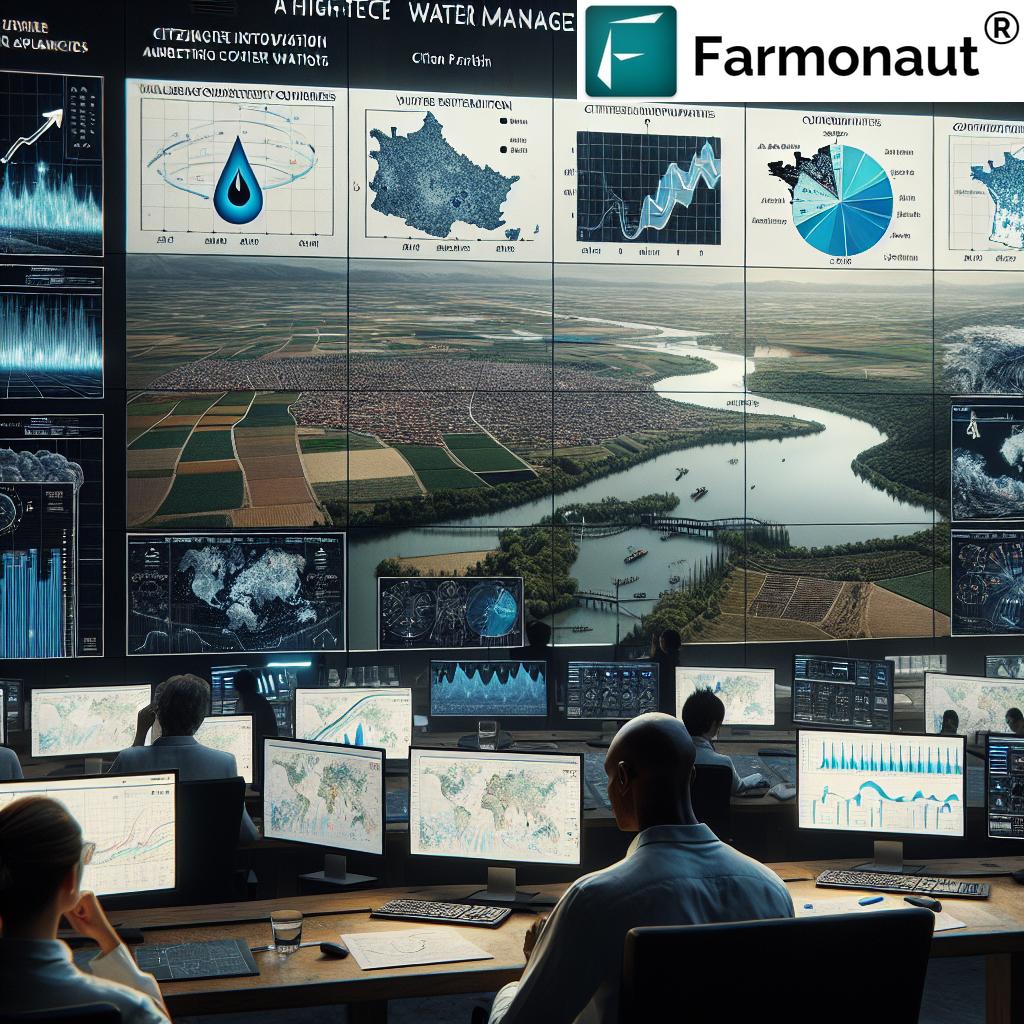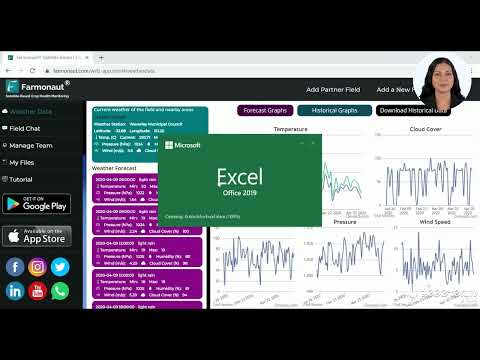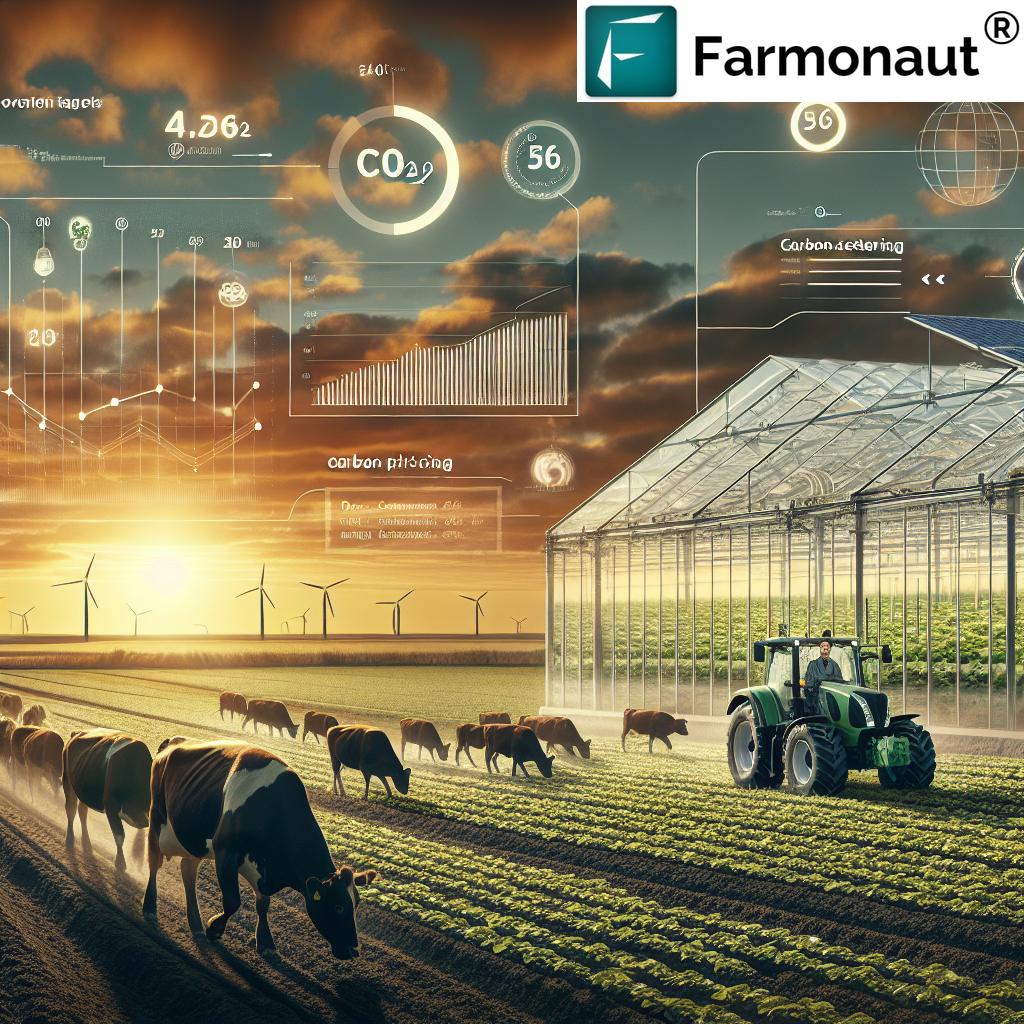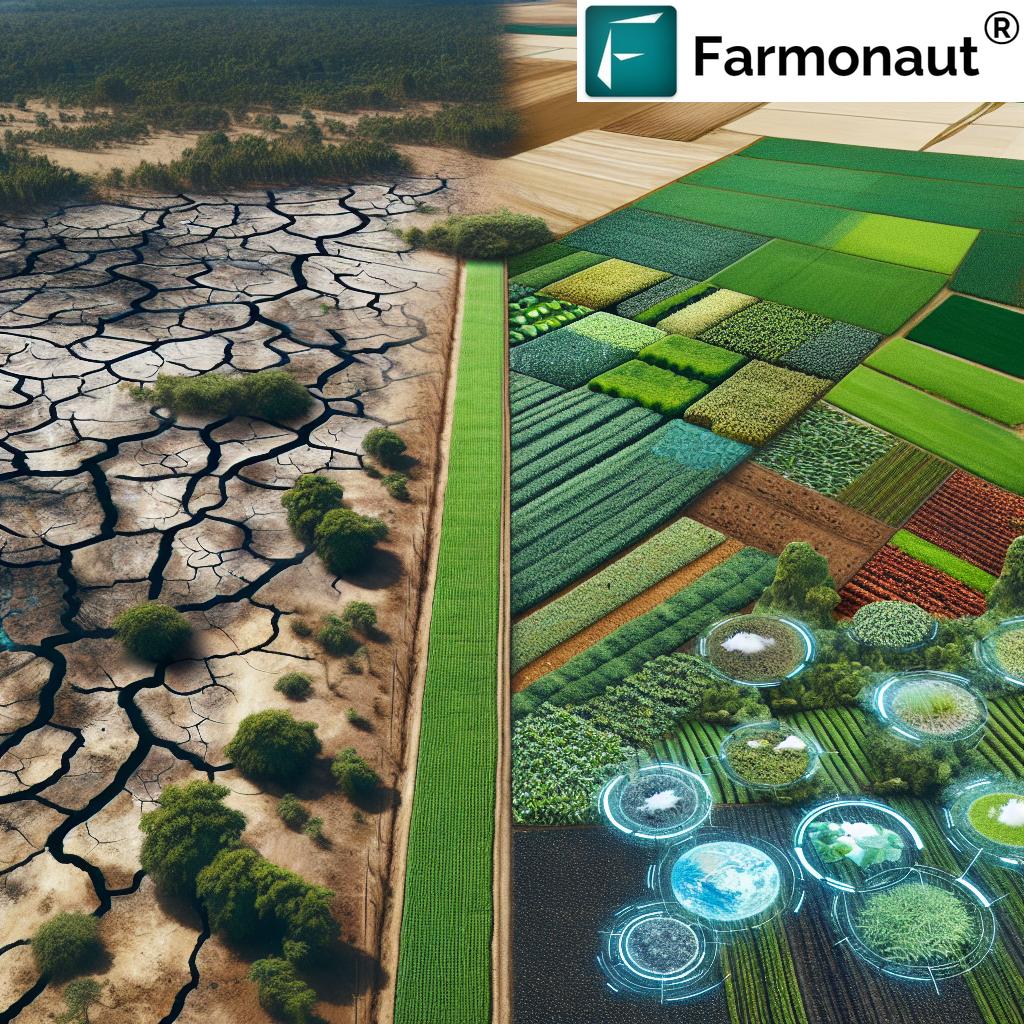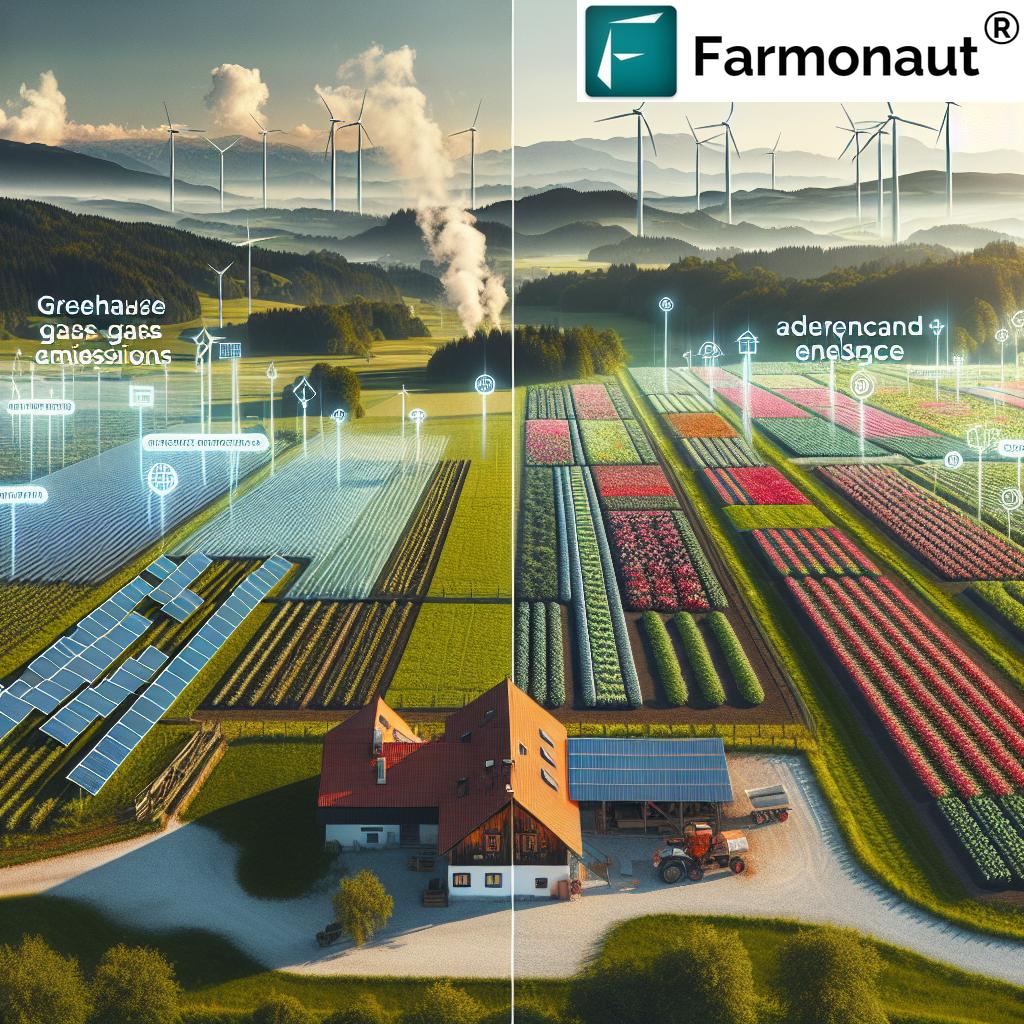Water Crisis in France: 7 Powerful Smart Solutions for Conservation
Table of Contents
- France’s Water Crisis: A Growing Concern
- Plan Eau: Ambition Meets Urgency
- 7 Smart Water Conservation Solutions for France
- Comparative Solutions Impact Table
- Beyond Infrastructure: Unlocking Data and Engagement
- Farmonaut: Empowering Agriculture with Data-Driven Insights
- Taking Action: Paving the Way for Sustainable Water Resource Management
- Frequently Asked Questions
“France loses up to 20% of its treated water annually due to leaks—smart meters can help detect these losses.”
France’s Water Crisis: A Growing Concern
France, a nation renowned for its lush landscapes, productive vineyards, and vibrant cities, is facing a new and pressing threat: a severe water crisis. As repeated droughts grip the south and west of the country, water levels are sinking to historic lows, and the state of water stress is spreading across regions that once enjoyed abundance.
The root causes are complex yet clear. Climate change is driving shifts in rainfall patterns and groundwater recharge. Rivers that have long sustained agriculture and communities are now unreliable, fed by reduced snowmelt and disrupted precipitation. Research shows that these changes are triggering water shortages, infrastructure damage, and significant agricultural losses.
According to the Organisation for Economic Cooperation and Development (OECD), if no action is taken, economic damages could climb to €2.5 billion in the Île-de-France region by the end of the century. The need to preserve this precious resource is more urgent than ever.
- Groundwater levels are dropping, leading to restrictions and rationing.
- Soils, especially clay, are shrinking and causing building damage.
- The agricultural sector is experiencing increased crop failure and yield reduction, directly impacting the nation’s food security and economy.
France Is Running Dry: The Reality of Depleted Water Resources
Evidence mounts as we witness:
- The south and west facing repeated summer bans on lawn watering and agricultural irrigation.
- Historic low flows in rivers such as the Loire and Garonne, threatening ecosystems and hydropower.
- Escalating stress on utilities to provide safe, reliable water supplies.
The situation underscores that the solution is not just about pipes and pumps. We must build resilience through smarter management and strategic conservation.
Plan Eau: Ambition Meets Urgency
In March 2023, President Macron launched Plan Eau, an ambitious response to the worsening water crisis in France. The plan is built on three critical pillars:
- Water use sobriety — encouraging reduced and more thoughtful usage across all sectors.
- Resource availability — securing and optimising supply through innovative infrastructure and management.
- Water quality — protecting health through better treatment and pollution control.
While important progress has been made (for instance, large-scale installation of smart water meters across French communities), one crucial aspect—citizen engagement—remains underutilised.
The Engagement Gap
French utilities have made remarkable strides by installing smart meters, but the true value of those meters is often lost. Data on consumption is being collected, but customers frequently can’t access, understand, or act on it. The critical question is: How do we unlock the power of data to drive real measurable reductions in water use?
“Over 60% of French citizens support data-driven water conservation, highlighting strong public engagement in sustainability efforts.”
7 Smart Water Conservation Solutions for France
Facing the escalating water crisis in France, we must embrace a new toolkit—one that combines data, behavioural science, and citizen engagement with smart technology. Here are seven high-impact, practical water conservation solutions shaping a sustainable future:
- Smart Water Meters and Real-Time Usage Insights
- Leak Detection Sensors and Proactive Repairs
- Data-Driven Irrigation Systems for Farms and Public Spaces
- Behavioural Science Engagement Platforms
- AI-Powered Demand Forecasting and Utility Management
- Citizen Engagement and Nudge Campaigns
- Satellite Monitoring and Resource Optimization
1. Smart Water Meters and Real-Time Water Usage Insights
Smart water meters are revolutionising monitoring in French utilities. By collecting real-time data on every litre consumed, these meters offer a detailed view of consumption patterns in households, businesses, and even municipal operations.
- Data-driven water savings: Utilities can detect anomalies, find leaks, and target high-use zones for engagement.
- Transparency: Citizens can access their own data through web or app dashboards, fostering accountability.
- Empowerment: With real-time water usage insights, end-users can take action instantly, adjusting behaviours to drive measurable reductions.
These platforms are increasingly standard in the Île-de-France and major urban areas, representing a foundational solution in the nation’s conservation strategy.
2. Leak Detection Sensors and Proactive Repairs
Every drop counts—yet as highlighted in our trivia, France loses up to 20% of treated water annually through leaks. Smart leak detection sensors are the answer.
- Technology: Sensors deployed throughout the water distribution network send real-time alerts to utilities on leaks or bursts.
- Rapid Action: Maintenance teams can deploy quickly, minimising losses and preventing further infrastructure degradation.
- Cost Savings: Catching leaks before they escalate spares enormous repair costs and extends the lifespan of existing pipes and pumps.
This solution unlocks massive potential for reducing water consumption across all French cities.
3. Data-Driven Irrigation Systems for Farms and Public Spaces
Agriculture is the backbone of rural France, but traditional irrigation is often imprecise and wasteful, especially during droughts and in sensitive regions.
- Smart irrigation systems leverage sensors, satellite imagery, and local weather forecasts to optimise watering schedules by field and crop type.
- Reduces overwatering, lowers electricity and water bills, and delivers maximum yield with minimum input.
- Parks and public gardens in urban areas also benefit from automated sprinkler timing and zone isolation.
Platforms such as Farmonaut provide real-time crop health monitoring via satellite, enabling farmers and municipalities to make decisions based on measurable data. This large-scale farm management app delivers control and optimisation, crucial for preserving precious resources.
Access Farmonaut’s advanced satellite data APIs and the latest technologies for resource management.
4. Behavioural Science Engagement Platforms
Technology alone cannot change behaviour—behavioural science for utilities is essential. Platforms leveraging behavioural insights deliver:
- Personalised nudges—timely reminders and hints tailored to individual lifestyles and habits.
- Household comparisons—users can compare their water use with similar households, creating healthy competition and self-awareness.
- Gamification—making conservation rewarding through achievements, badges, and even discounts.
SaaS platforms, as advocated in Plan Eau, help utilities unlock measurable reductions in water use by empowering the customer journey from awareness to sustained action.
5. AI-Powered Demand Forecasting and Utility Management
Managing an entire city’s or region’s water needs is a complex, dynamic challenge. AI and machine learning now provide utilities and policymakers with:
- Predictive modeling: Anticipate demand spikes due to heatwaves, festivals, or agricultural cycles.
- Resource allocation: Optimise pump operations, recharge cycles, and storage utilisation.
- Early warning systems: Identify emerging areas of stress to pro-actively address shortages.
These intelligent systems improve operational efficiency, comply with regulatory targets, and ensure that resources are allocated where needed most—before a crisis becomes unmanageable.
6. Citizen Engagement and Nudge Campaigns
Community engagement in water conservation is equally vital. Well-designed nudge campaigns use data, behavioural science, and real-time feedback to activate personal and collective responsibility.
- Digital journeys—informative emails, SMS alerts, and web tools showing progress and providing custom water-saving tips.
- Comparisons and friendly competitions—mobilising neighbours and communities towards shared goals.
- Customer satisfaction rises as utilities communicate proactively, educate, and celebrate milestones.
Platforms that deliver this experience help bridge the “engagement gap” spotlighted by Plan Eau and drive lasting change.
7. Satellite Monitoring and Resource Optimization
Innovations in remote sensing, especially via satellites, are transforming our understanding of water, soil, and crop conditions at the landscape scale. Farmonaut is at the forefront, providing:
- Multispectral imagery—to map soil moisture, crop stress, and vegetation health on farms and natural landscapes.
- Real-time actionable insights for irrigation management, fertilisation, and risk reduction—creating measurable reductions in water use and minimising losses.
- Carbon footprint tracking—helps agribusinesses and policymakers monitor environmental impact and stay compliant with ever-tightening regulations.
Satellite data, AI advisory, and digital management platforms underpin a new era of precision and sustainability in French agriculture and beyond.
Comparative Solutions Impact Table
To help you compare these smart solutions, we’ve prepared this at-a-glance table for the water crisis in France. It illustrates technology, estimated impact, costs, and major benefits.
| Solution Name | Technology Used | Estimated Water Savings (%) | Implementation Cost (Estimated Range) | Major Benefits | Case Study Examples (if available) |
|---|---|---|---|---|---|
| Smart Water Meters | IoT-enabled meters, real-time data analytics | Up to 20% | High (€80–€150/property) | Detect leaks, empower users, immediate feedback | Urban France, Île-de-France rollouts |
| Leak Detection Sensors | Sensor arrays, wireless telemetry | 10–25% | Medium to High | Reduces non-revenue water, limits infrastructure damage | Nationwide pilot programs |
| Data-Driven Irrigation | Soil sensors, satellite imagery, AI scheduling | 20–40% | Medium | Maximises yield, reduces overwatering and costs | Farmonaut satellite platform users |
| Behavioural Science Engagement Platforms | Digital SaaS platforms, analytics, behavioural nudges | 8–13% | Low to Medium | Long-term habit formation, increased customer satisfaction | UK, US, AU digital nudge programs |
| AI Demand Forecasting | Machine learning, predictive analytics, smart pumps | Variable (5–12%) | Medium | Prevents shortages, optimises storage, improves reliability | Urban utility pilots |
| Citizen Engagement & Nudges | Web/mobile platforms, email/SMS feedback | 5–15% | Low | Boosts awareness, fosters community action | French and Italian utility initiatives |
| Satellite Monitoring & Resource Optimization | Multispectral satellite data, AI advisory | 15–30% | Medium | Macro-level monitoring, targeted action, crop yield boost | Farmonaut, global agritech adoption |
Alt text: Smart Water Conservation Solutions France Comparative Impact Table
Beyond Infrastructure: Unlocking Data and Engagement
Infrastructure upgrades—new pipes, reservoirs, and pumps—will always play a critical role in improving water management. Yet, the data we already have is a massive, underutilised asset. Our future will be shaped by how we turn:
- Data into actionable insights
- Behavioural science into measurable outcomes
- Engagement into lasting change
The tools are here: smart water meters, leak sensors, advanced analytics, and AI. But citizens must access, understand, and trust these tools. Platforms that bridge this gap empower everyone to make every drop count.
Farmonaut: Empowering Agriculture with Data-Driven Insights
One of the most pressing arenas of the water crisis in France is agriculture. As fields and vineyards experience drainage and crops face greater uncertainty, precision technology becomes indispensable. This is where Farmonaut delivers actionable value for farmers, agribusinesses, NGOs, and governments—not just in France, but worldwide.
Satellite-Based Crop Health Monitoring
Farmonaut’s platform harnesses multispectral satellite imagery to deliver:
- Vegetation indices (NDVI) for crop health tracking
- Soil moisture assessment for precision irrigation
- Resource allocation insights—targeting inputs exactly where and when they’re needed
This data-driven approach empowers reducing water consumption while improving yields and minimising environmental impact. When fields are managed by the numbers, every farm becomes part of the conservation solution.
Discover More:
Farmonaut Large Scale Farm Management
|
Fleet Management Tools
|
Blockchain-Based Product Traceability
AI Advisory & Weather Forecasting for Sustainable Water Resource Management
Farmonaut’s Jeevn AI Advisory System analyses satellite data and weather forecasts, delivering personalised recommendations on:
- When and how much to irrigate
- Integrated pest management
- Water and input savings
Farmers receive this intelligence on-the-go—via Android, iOS or web—enabling timely decision-making and resource management.
Experience precision agriculture made affordable through Farmonaut’s APIs and developer documentation. Integrate advanced satellite and weather data into your own agri-systems for optimal results.
Carbon Footprinting and Sustainability Compliance
Sustainability is key to preserving water resources and fighting climate change. Farmonaut’s carbon footprinting feature helps farmers and agribusinesses monitor and reduce their environmental impact, ensuring compliance with evolving regulations and building consumer trust.
Making Financing Accessible for Water Efficient Farming
Farmonaut supports financial institutions in verifying crop status for loans and insurance via satellite—a game-changer for farmer access to credit and risk management. This helps align economic incentives towards sustainability and resilience, not overexploitation.
Read more: Farmonaut Crop Loan & Insurance Solutions
Get Started with Farmonaut
Precision water and resource management is within everyone’s reach. See the plans below to find what fits your needs.
Taking Action: Paving the Way for Sustainable Water Resource Management
The water crisis in France is not an isolated event. It’s the outcome of decades of evolving climate, social and resource pressures, now converging into an era of urgency. Our country can turn crisis into opportunity—by reimagining water management at every step.
With data-driven water savings from smart meters, leak sensors, digital engagement, and satellite platforms, utilities can:
- Meet regulatory targets and improve operational efficiency
- Strengthen customer satisfaction and trust
- Enable citizens and farmers to actively engage in conservation
- Protect food security, local economies, and ecosystem health
As Plan Eau guides our ambitions, it is time to bridge the engagement gap. Technologies are here, but they are only as effective as our willingness to use them—together, transparently, and with urgency.
The Role of Each of Us
- Citizens: Track your water usage, act on insights, share knowledge.
- Farmers: Adopt precision irrigation and crop health monitoring to get more value from less water.
- Business and Government: Invest in data-driven solutions, nudge campaigns, and transparent reporting.
By working together and championing data, engagement, and behavioural science, we can realise meaningful reductions in water consumption—and ensure France’s legacy as a land of abundance, not scarcity.
Frequently Asked Questions
-
Why is France facing a water crisis?
France is experiencing more frequent and severe droughts, especially in the south and west, due to shifting climate patterns, decreased rainfall, and falling groundwater levels. Combined with aging infrastructure and inefficient management, these factors have created significant water shortages.
-
How do smart water meters help reduce water consumption?
Smart meters provide real-time usage data to utilities and consumers, enabling fast leak detection, instant feedback on usage changes, and opportunities for digital engagement. By empowering customers to see and manage their consumption, these meters are proven tools for reducing water waste.
-
What is the role of behavioural science in water conservation?
Behavioural science helps design engagement journeys and nudges that encourage lasting changes in water habits, such as personalised tips, timely reminders, and peer comparisons. When combined with real data, these nudges achieve measurable and scalable reductions across communities.
-
How can agriculture benefit from data-driven water conservation?
By integrating tools like satellite imagery, weather AI, and smart irrigation systems, farms can optimise resource allocation, reduce overwatering, and improve yields. Platforms like Farmonaut enable affordable and scalable precision farming for all farm sizes.
-
How do I get started with smart water management?
Utilities, businesses, and individuals can adopt tools such as smart meters, SaaS conservation platforms, or advanced agricultural management apps. Start by downloading the Farmonaut app or access its satellite APIs for custom integration.
Explore Farmonaut’s Solutions Here
Summary: Sustainability, Engagement, and the Future of Water in France
The water crisis in France demands solutions that go beyond traditional engineering. As repeated droughts bring the country into a state of growing stress, it becomes clear the answer lies not only in upgraded pipes and pumps, but also in data-driven platforms, behavioural science, and active citizen engagement.
We must leverage real-time insights, smart technologies, targeted nudges, and transparent communication to create a sustainable future. The experiences and tools outlined above—from smart water meters to satellite-based farm management platforms like Farmonaut—showcase just how powerful our collective efforts can be.
Whether you are a utility, a policymaker, a farmer, or a citizen, actionable change begins with the resources at your fingertips. Let’s make every drop count.



